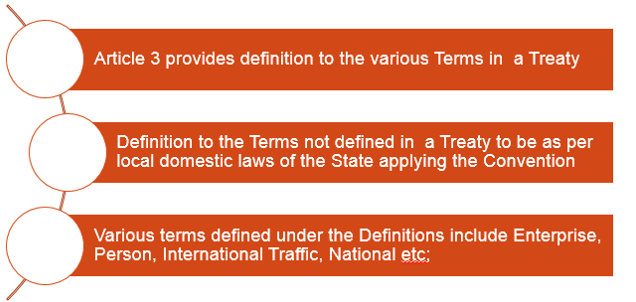| Article/Para No. |
OECD Model Tax Convention on Income and on Capital 2017 |
UN Model Convention 2017 |
| 3 |
General Definitions |
General Definitions |
| 1 |
For the purposes of this Convention, unless the context otherwise requires:
1(a) the term “person” includes an individual, a company and any other body of persons; |
For the purposes of this Convention, unless the context otherwise requires:
1(a) The term “person” includes an individual, a company and any other body of persons; |
| Comments
UN & OECD Models: Article 3(1)(a) of the OECD Model is identical to Article 3(1)(a) of the UN Model. |
| 1(b) |
the term “company” means any body corporate or any entity that is treated as a body corporate for tax purposes; |
1(b) The term “company” means any body corporate or any entity that is treated as a body corporate for tax purposes;
|
| Comments
UN & OECD Models: Article 3(1)(b) of the OECD Model is identical to Article 3(1)(b) of the UN Model.This article provided that if an entity is not incorporated as a companybut is treated as a body corporate for tax purpose, it shall be considered as a company for application of Treaty.

|
| 1(c) |
the term “enterprise” applies to the carrying on of any business; |
|
| 1(d) |
the terms “enterprise of a Contracting State” and “enterprise of the other Contracting State” mean respectively an enterprise carried on by a resident of a Contracting State and an enterprise carried on by a resident of the other Contracting State; |
1(c) The terms “enterprise of a Contracting State” and “enterprise of the other Contracting State” mean respectively an enterprise carried on by a resident of a Contracting State and an enterprise carried on by a resident of the other Contracting State; |
| Comments
UN & OECD Models: Article 3(1)(d) of the OECD Model is identical to Article 3(1)(c) of the UN Model.
Unlike the UN Model, Article 3(1)(c) of the OECD Model additionally defines the term “enterprise” as applying “to the carrying on of any business”. Article 3(1)(h) of the OECD Model defines “business” to expressly include the “performance of professional services and of other activities of an independent character”; hence, on a combined reading of the two definitions, one can argue that performance of such professional services/activities would be dealt with under Article 7 dealt with under Article 7 (Business Profits) and not Article 21 (Other Income) of the OECD Model. |
| 1(g) |
the term “national”, in relation to a Contracting State, means:
(i) any individual possessing the nationality or citizenship of that Contracting State; and
(ii) any legal person, partnership or association deriving its status as such from the laws in force in that Contracting State; |
1(f) The term “national” means:
(i) Any individual possessing the nationality of a Contracting State;
(ii) Any legal person, partnership or association deriving its status as such from the laws in force in a Contracting State. |
- Definition of “national” in Article 3(1)(g) of the OECD Model is similar to definition in Article 3(1)(f) of the UN Model, except that for natural persons (individuals), the OECD Model incorporates additional alternative criteria of “citizenship”.
- The definition of national , is relevant because Article 24 – Non-discrimination, provides that the Nationals of any contracting State shall not be subjected to discrimination, merely by this reason. Meaning of “national” depends on rules of each Contracting State Nationality of person other than individuals, who are legal persons like partnerships or association, depends on the laws in force in that respective Contracting State.
|
| 2 |
As regards the application of the Convention at any time by a Contracting State, any term not defined therein shall, unless the context otherwise requires or the Competent Authority agrees to a different meaning, pursuant to the provisions of Article 25, have the meaning that it has at that time under the law of that State for the purposes of the taxes to which the Convention applies, any meaning under the applicable tax laws of that State prevailing over a meaning given to the term under other laws of that State. |
As regards the application of the Convention at any time by a Contracting State, any term not defined therein shall, unless the context otherwise requires, have the meaning that it has at that time under the law of that State for the purposes of the taxes to which the Convention applies, any meaning under the applicable tax laws of that State prevailing over a meaning given to the term under other laws of that State. |
| Article 3(2) implies that for terms, which have not been specifically defined in a Tax Treaty, the applicable meaning of such a word under the domestic law of the Contracting State in which tax is being levied, shall be considered if only one meaning is given or , if more than one definitions are given, then the one for particular provision at issue, should be used. However, under the OECD Model, such an interpretation is subject to any contrary meaning that the Competent Authority of the two States may agree. This provision is absent in the UN Model.
But if both the tax and non-tax laws of a Contracting State, deifine such term, the meaning as per the tax law has to be considered for the purpose of application of Tax Treaty. |




